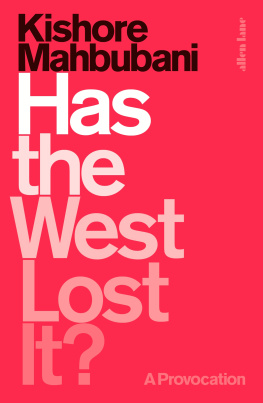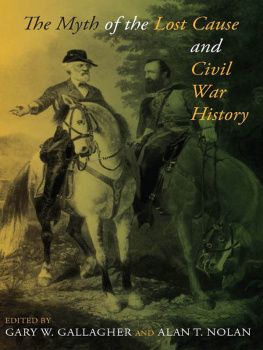Ben Ryan - How the West Was Lost: The Decline of a Myth and the Search for New Stories
Here you can read online Ben Ryan - How the West Was Lost: The Decline of a Myth and the Search for New Stories full text of the book (entire story) in english for free. Download pdf and epub, get meaning, cover and reviews about this ebook. year: 2019, publisher: Oxford University Press, genre: Politics. Description of the work, (preface) as well as reviews are available. Best literature library LitArk.com created for fans of good reading and offers a wide selection of genres:
Romance novel
Science fiction
Adventure
Detective
Science
History
Home and family
Prose
Art
Politics
Computer
Non-fiction
Religion
Business
Children
Humor
Choose a favorite category and find really read worthwhile books. Enjoy immersion in the world of imagination, feel the emotions of the characters or learn something new for yourself, make an fascinating discovery.
How the West Was Lost: The Decline of a Myth and the Search for New Stories: summary, description and annotation
We offer to read an annotation, description, summary or preface (depends on what the author of the book "How the West Was Lost: The Decline of a Myth and the Search for New Stories" wrote himself). If you haven't found the necessary information about the book — write in the comments, we will try to find it.
Ben Ryan: author's other books
Who wrote How the West Was Lost: The Decline of a Myth and the Search for New Stories? Find out the surname, the name of the author of the book and a list of all author's works by series.
How the West Was Lost: The Decline of a Myth and the Search for New Stories — read online for free the complete book (whole text) full work
Below is the text of the book, divided by pages. System saving the place of the last page read, allows you to conveniently read the book "How the West Was Lost: The Decline of a Myth and the Search for New Stories" online for free, without having to search again every time where you left off. Put a bookmark, and you can go to the page where you finished reading at any time.
Font size:
Interval:
Bookmark:


First published in the United Kingdom in 2019 by
C. Hurst & Co. (Publishers) Ltd.,
41 Great Russell Street, London, WC1B 3PL
Ben Ryan, 2019
All rights reserved.
Distributed in the United States, Canada and Latin America by Oxford University Press, 198 Madison Avenue, New York, NY 10016, United States of America.
The right of Ben Ryan to be identified as the authors of this publication is asserted by him in accordance with the Copyright, Designs and Patents Act, 1988.
A Cataloguing-in-Publication data record for this book is available from the British Library.
EISBN: 9781787383463
www.hurstpublishers.com
PART ONE
WHAT THE WEST IS
PART TWO
HOW THE WEST WAS LOST
PART THREE
HOW TO WIN IT BACK
To paraphrase The Hitchhikers Guide to the Galaxy, the West is big. Really big. Attempting to critique it, and doing full justice to the sheer range of issues that this entailspolitical, social, historical and philosophicalis probably impossible. Inevitably, some things have not been dealt with in as much depth as they should have been, and I am sure there are plenty of issues that deserved inclusion which have been passed over completely, for which I can only apologise.
Even to cover what is included in this book has required a huge amount of advice and guidance from friends and colleagues. These include Alexander Faludy and Jakub Krupa, who provided essential advice, contacts and material on Central and Eastern Europe, and Izzy Ryan for her advice on tribalism and identity. All of my colleagues at Theos have been wonderful sources of support and wisdom on a range of issues, but particularly Nick Spencer, who also read through drafts and provided detailed comments that have greatly strengthened the book as a whole. I would like to thank Michael Dwyer at Hurst for his enthusiasm for the topic and his colleague Lara Weisweiller-Wu for her hugely helpful and constructive feedback.
I am the child of two academics, and while this has scarred me in all sorts of ways, it has also given me two outstanding historians and editors in the family, who each provided excellent advice and criticisms on early drafts.
This book would not have been possible without my wife Camilla, who was the key sounding board for many of my ideas and an invaluable source of support.
Finally, I would like to pay tribute to the late Dr Tony Atcherley, a wonderful family friend, teacher and philosopher on whose advice I read several key books that inspired this one. I would have loved to have been able to discuss its arguments further with him.
Westerners seem to love the idea that the West is in crisis. Since at least the end of the First World War, writers in every decade have believed that the West is in danger, declining, or even already dead. The immediate aftermath of the First World War prompted a good deal of soul searching and doubt in the progress of the Westmost prominently in Oswald Spenglers seminal Decline of the West. In the 2010s, we have seen various books lamenting the decline of liberal democracy, liberalism itself, Europe, and others.
Though not always recognized as such, this is a profoundly and distinctly Western anxiety. The right-wing British journalist Douglas Murray repeatedly notes in The Strange Death of Europe (2017) that Europe is the only continent with the urge to obsess about what it is and what its identity amounts to.
This is exactly the right question, and the answer must be: the kind of person who has been saturated within a Western intellectual traditionone that obsesses over its own identity, past and future. The West is nothing if not an intellectual space characterized by constant introspection and an ongoing existential crisis.
This book sits self-consciously within that tradition. As such, one of the questions that plagued me in writing it was whether the current Western crisis, as I perceive it, is in any way special. Chronocentrism, the charge of seeing things only through the lens of ones own time, is a real challenge. Its impossible to escape the sense that this feels like the end of an era: the end of Western self-confidence and global dominance. The question is whether this is just a temporary blip, the beginning of a long slow declinethe political scientist David Runciman believes that Western democracy is experiencing a mid-life crisis: over the hill but with many years leftor whether we will continue bumbling on, in hope rather than expectation of something getting better.
Whichever of those scenarios proves to be true, this is an era characterized by disappointment, disillusionment and no little anger. The anger is manifesting itself in an increasingly hostile and extreme tone of public debate. To call someone a traitor, a saboteur, accuse them of treason, of being an enemy of the people, or even diabolic would once have been shocking; now it just seems exhaustingly commonplace. Anger is the default of a political sphere gone wrong.
The sense of disappointment and disillusion is felt more by some groups than othersbut is certainly a feature of my own generation. I was born in 1990, halfway between the Berlin Wall coming down and the final dissolution of the USSR. The Wests last great ideological opponent (or so it was widely thought) had, in a remarkably short space of time, simply ceased to exist. The Cold War was something I learnt about from James Bond films, school history lessons and family stories (both of my parents lived for periods in the Soviet Union), but was not something I had personally experienced. Thatcher and Reagan were semimythical heroes or villains, depending on who you spoke to. This was the firstand now probably lastpost-historic generation, growing up in an atmosphere of supreme confidence in the Western worldviews moral superiority and inevitable victory. The political culture of my youth was the confidence of Blairs New Labour, a promised end to boom and bust, and a supreme confidence that the middle way was working, and working well.
Even the concept of the West as a geographically limited area looked to be an increasingly absurd anachronism. Japan and South Korea were democratic, capitalist cultures that looked to be blending seamlessly into a broader Western cultureparticularly at the youth level where everyone was playing the same video games on the same consoles and increasingly watching the same TV. Has there ever been a phenomenon quite as remarkably capitalist and internationalist, yet as entirely Eastern in provenance, as Pokmon? The long-disparaged dark continent of Africa also looked to be riding a wave of Western optimism, defined by Nelson Mandelas presidency in the South and in the North, from the late 90s onwards, by Western powers rapprochement with Muammar Gaddafis formerly ostracized Libyan regime. Even Latin America, where every nation barring Costa Rica had had at least one dictator in power during the twentieth century, looked to be establishing a newand increasingly left-wingdemocratic culture. By the time I was in secondary school, not only had most of formerly communist Eastern Europe been rehabilitated, but we were well on the way to many of those states joining the European Union, itself increasingly confident and assertive.
Of course, this could not last, and the early 2000s saw a series of shocks to the system. Jean-Marie Le Pens impressive showing in the 2002 French presidential election was an early warning shot that cosmopolitan liberalism was not going to go unchallenged. Austrias far-right Freedom Party had already gone one better and achieved a place in the government from 2000 to 2005a result met with sanctions from other Western nations, which didnt prevent the same partys return to power in 2017. The greatest blow, of course, was 9/11 and the subsequent War on Terror. This has done more harm to American and Western self-confidence than any other event since Vietnam, or even before. At no point in the Cold War did the communists, existential threat though they were, succeed in killing American civilians on the mainland US with a military strike. Al-Qaeda, in that sense, has proven itself a far more damaging enemy of everyday American life. The ill-fated Iraq War, itself a consequence of the Western response to 9/11, has done incalculable damage to trust in politicians and to public views on the value of foreign intervention.
Font size:
Interval:
Bookmark:
Similar books «How the West Was Lost: The Decline of a Myth and the Search for New Stories»
Look at similar books to How the West Was Lost: The Decline of a Myth and the Search for New Stories. We have selected literature similar in name and meaning in the hope of providing readers with more options to find new, interesting, not yet read works.
Discussion, reviews of the book How the West Was Lost: The Decline of a Myth and the Search for New Stories and just readers' own opinions. Leave your comments, write what you think about the work, its meaning or the main characters. Specify what exactly you liked and what you didn't like, and why you think so.





